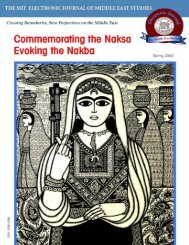The Link - Americans for Middle East Understanding
The Link - Americans for Middle East Understanding
The Link - Americans for Middle East Understanding
Create successful ePaper yourself
Turn your PDF publications into a flip-book with our unique Google optimized e-Paper software.
qÜÉ=iáåâ= m~ÖÉ=N M=<br />
Jordan, and Iraq would take in some of the Palestinians<br />
Israel had been evicting. His proposal included mutual<br />
confiscation of property. London nixed the idea as too<br />
radical.<br />
El-Said then went to his back-up plan and began to<br />
create the conditions that would make the lives of Iraqi<br />
Jews so miserable they would leave <strong>for</strong> Israel. Jewish<br />
government employees were fired from their jobs; Jewish<br />
merchants were denied import/export licenses; police<br />
began to arrest Jews <strong>for</strong> trivial reasons. Still the Jews did<br />
not leave in any great numbers.<br />
In September 1949, Israel sent the spy Mordechai<br />
Ben-Porat, the one mentioned in Venom of the Zionist<br />
Viper, to Iraq. One of the first things Ben-Porat did was to<br />
approach el-Said and promise him financial incentives to<br />
have a law enacted that would lift the citizenship of Iraqi<br />
Jews.<br />
Soon after, Zionist<br />
a n d I r a q i<br />
representatives began<br />
<strong>for</strong>mulating a rough<br />
draft of the bill,<br />
according to the<br />
model dictated by<br />
Israel through its<br />
agents in Baghdad.<br />
<strong>The</strong> bill was passed by<br />
the Iraqi parliament in<br />
March 1950. It<br />
empowered the<br />
government to issue<br />
one-time exit visas to<br />
Jews wishing to leave<br />
the country. In<br />
March, the bombings<br />
began.<br />
Sixteen years later,<br />
the Israeli magazine<br />
Haolam Hazeh,<br />
published by Uri<br />
Avnery, then a<br />
Knesset member, accused Ben-Porat of the Baghdad<br />
bombings. Ben-Porat, who would become a Knesset<br />
member himself, denied the charge, but never sued the<br />
magazine <strong>for</strong> libel. And Iraqi Jews in Israel still call him<br />
Morad Abu al-Knabel, Mordechai of the Bombs.<br />
As I said, all this went well beyond the<br />
comprehension of a teenager. I knew Jews were being<br />
killed and an organization existed that could lead us to<br />
the Promised Land. So I helped in the exodus to Israel.<br />
Later, on occasions, I would bump into some of these<br />
Iraqi Jews in Israel. Not infrequently they’d express the<br />
sentiment that they could kill me <strong>for</strong> what I had done.<br />
Opportunities<br />
<strong>for</strong> Peace<br />
After the Israeli attack on the Jordanian village of<br />
Qibya in October, 1953, Ben Gurion went into voluntary<br />
exile at the Sedeh Boker kibbutz in the Negev. <strong>The</strong> Labor<br />
party then used to organize many buses <strong>for</strong> people to go<br />
visit him there, where they would see the <strong>for</strong>mer prime<br />
minister working with sheep. But that was only <strong>for</strong><br />
show. Really he was writing his diary and continuing to<br />
be active behind the scenes. I went on such a tour.<br />
We were told not to try to speak to Ben Gurion, but<br />
when I saw him, I asked why, since Israel is a democracy<br />
with a parliament, does it not have a constitution? Ben<br />
Gurion said, “Look, boy”—I was 24 at the time—“if we<br />
have a constitution,<br />
we have to write in it<br />
the border of our<br />
country. And this is<br />
not our border, my<br />
dear.” I asked, “<strong>The</strong>n<br />
where is the border?”<br />
He said, “Wherever<br />
the Sahal will come,<br />
this is the border.”<br />
Sahal is the Israeli<br />
army.<br />
Ben Gurion told the<br />
world that Israel<br />
accepted the partition<br />
and the Arabs rejected<br />
it. <strong>The</strong>n Israel took<br />
half of the land that<br />
was promised to the<br />
Arab state. And still<br />
he was saying it was<br />
not enough. Israel<br />
needed more land.<br />
How can a country<br />
make peace with its<br />
neighbors if it wants to take their land? How can a<br />
country demand to be secure if it won’t say what borders<br />
it will be satisfied with? For such a country, peace would<br />
be an inconvenience.<br />
I know now that from the beginning many Arab<br />
leaders wanted to make peace with Israel, but Israel<br />
always refused. Ben Gurion covered this up with<br />
propaganda. He said that the Arabs wanted to drive<br />
Israel into the sea and he called Gamal Abdel Nasser the<br />
Hitler of the <strong>Middle</strong> <strong>East</strong> whose <strong>for</strong>emost intent was to<br />
destroy Israel. He wanted America and Great Britain to<br />
treat Nasser like a pariah.<br />
<strong>The</strong> author (right) was an activist in what became known as Israel’s “Black<br />
Panthers,” a movement of Jews from Islamic countries that fought against<br />
ethnic discrimination. Giladi represented the movement on the executive<br />
committee of the Histadrut, Israel’s trade union. This photo was taken in 1979<br />
as members of an Israeli Architects Association signed petitions <strong>for</strong> Giladi’s<br />
candidacy in Histadrut elections.




